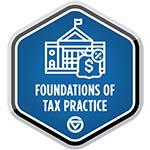Majors, Programs, Certificates, and Badges
The Bachelor of Business Administration in accounting provides a solid foundation for licensure as a certified public accountant (CPA), as well as career opportunities in corporate accounting, auditing, taxation, and management of business, government and nonprofit organizations.
The Master of Science in accounting offers an intensive, concentrated learning experience. This specialization is designed for those pursuing Certified Public Accountant certification and careers in public, industry, and nonprofit accounting.

The School of Accounting's badge in advanced tax practice is designed to prepare students for advanced level tax research and planning for a variety of situations, including tasks such as researching and providing tax law conclusions for tax issues posited by various tax fact patterns regarding employee benefit plans and executive compensation under the Internal Revenue Code and ERISA; fundamental concepts applicable to tax accounting periods and to consolidated income tax returns; and federal tax practice and procedure.
Grand Valley State University combined degree programs offer current qualified undergraduate students the opportunity to complete both an undergraduate and graduate degree, meeting their unique personal, academic, and career goals. Pursuing a combined degree can reduce the cost and total time required to complete both.

The corporate transactions is designed to prepare you for advanced level tax research and planning for corporate transactions, including researching and providing tax law conclusions for tax issues posited by various tax fact patterns regarding corporate liquidations, liquidation of subsidiaries, taxable and nontaxable acquisitive transactions, and more.

The School of Accounting's foundations of tax practice badge is designed to prepare you for entry-level tax research, planning, and preparation for corporations, partnerships, estates, gifts, and trusts, including tasks such as explaining the techniques of tax research and formal written communication; explaining the hierarchy of tax law sources, including the Internal Revenue Code, case law, administrative regulations and administrative ruling; and researching and providing tax law conclusions for tax issues posited by various tax fact patterns regarding taxability of corporations and their shareholders, transfer tax rules, and formation and operation of partnerships.
The Master of Science in Taxation offers students the opportunity to examine substantive tax law and enhance their analytical and research skills, enabling them to identify relevant issues and arrive at appropriate conclusions or courses of action.



